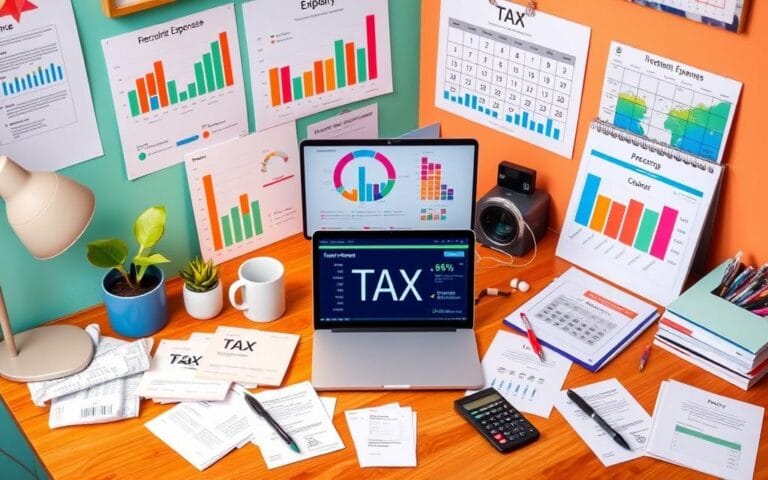adversiment
Dealing with a lot of debt can be tough. Learning about your options can lead to financial freedom. Debt consolidation is one method that makes repayment easier by combining your debts. It can also lower interest rates. We’ll look at ways to consolidate debt, like personal loans and balance transfer credit cards. We’ll discuss the good and bad of each. If you’re trying to get out of credit card debt or considering consolidating your loans, we’ve got information to help you decide.

Understanding Debt Consolidation
Understanding debt consolidation means knowing it helps handle many debts. This can include loans and credit card bills. By merging them into one payment, managing finances gets easier. This method makes keeping up with payments simpler and helps avoid missed deadlines.
A debt consolidation plan can affect your credit score. At first, a new loan might lower your score a bit. But, handling one payment well can improve your score later on. A good debt management plan also helps you pay on time and lower your debt.
Debt payoff strategies are crucial in debt consolidation. They require you to look at your budget closely. This helps you put your money where it’s most needed. By focusing on debts with high interest first, you can cut your total debt. This makes you more financially secure. Many Americans find themselves in debt, making solid plans all the more essential.
What is Debt Consolidation?
Debt consolidation helps combine many debts into one easy payment. It’s for people wanting to make their debt payments simpler. Debt consolidation explained means getting a new loan to clear existing debts. This includes credit cards, personal loans, and medical bills. By doing this, you can have one payment plan and possibly lower interest rates.
Loan consolidation is different from other debt solutions like debt settlement or bankruptcy. Debt settlement reduces what you owe through negotiation. Bankruptcy might erase debts completely in some cases. But, debt consolidation keeps your credit in good standing by reducing how many debts you have.
Some people use credit card debt relief methods with debt consolidation. This way, they manage their money better. Consolidating debts can lead to better interest rates and payment conditions. This helps lessen the financial load.
The Pros of Debt Consolidation
Debt consolidation has several benefits for those with many financial obligations. It combines debts into one account. This leads to better financial management and lower overall costs.
Simplified Payments
Debt consolidation’s main benefit is making payments easier. Instead of dealing with many bills, debtors can have just one. This reduces stress and helps avoid late payments, which boosts credit scores. One payment each month also means less confusion and a clearer financial picture.
Lower Interest Rates
Lower interest rates are another big advantage. Moving high-rate debts to a loan with lower interest can cut down what you owe. This can save a lot of money and help pay off debt sooner. Finding a good rate helps borrowers feel in charge of their money and encourages smart financial actions.
| Type of Debt | Average Interest Rate (%) | Consolidation Option | Estimated Savings |
|---|---|---|---|
| Credit Cards | 15-25 | Consolidation Loan | Up to 10% |
| Personal Loans | 10-20 | Balance Transfer | 5-10% |
| Student Loans | 3-7 | Direct Consolidation | 1-3% |
So, the benefits of debt consolidation can turn tough financial situations into ones that feel easier to handle. It’s a useful choice for many people wanting to take back control over their money.
The Cons of Debt Consolidation
Debt consolidation simplifies finances but has downsides. It’s important to look at these carefully. Knowing the cons of debt consolidation helps in making smart money moves.
Potential Fees
One big issue is the potential fees that come with consolidation. You may face charges like loan origination fees and balance transfer fees. Even late payment penalties can arise. These extra costs can cut into the savings you expected, increasing financial strain.
Longer Payment Terms
Debt consolidation often leads to longer payment terms. Lower monthly payments might seem good at first, but they mean paying more interest long-term. Thus, it could take longer to be debt-free. This extends the time to achieving financial relief.

Debt Consolidation Options
Exploring debt consolidation options helps manage finances better. Each option has unique benefits and risks. Knowing these helps find the best choice for financial situations.
Personal Loans
Personal loans are widely used for debt consolidation. They let people borrow a lump sum to clear many debts. These loans come with fixed payments, making budgeting easier.
They often have lower rates than credit cards. Thus, they can improve credit scores if used right.
Balance Transfer Credit Cards
Balance transfer cards are good for short-term credit card debt management. They offer low-interest rates for transferred balances early on. This makes it easier to pay off debts.
But, it’s key to watch the intro periods and transfer fees. Used smartly, they can save a lot of money on interest.
Home Equity Loans
Home equity loans let homeowners use their property’s equity. This option provides a big sum for consolidating big-interest debts. Despite benefits, there are risks like foreclosure if payments aren’t made.
| Option | Pros | Cons |
|---|---|---|
| Personal Loans | Fixed monthly payments, potential lower interest rates | Possible fees, requires good credit score |
| Balance Transfer Credit Cards | Low-interest introductory rates, simple to manage | High interest after the promotional period, potential fees |
| Home Equity Loans | Access to larger sums, potential tax benefits | Risk of foreclosure, closing costs involved |
Alternatives to Debt Consolidation
Understanding the different ways to deal with debt is important. There are several methods to manage debt without the downsides of consolidation. Here are some options worth looking into.
Debt Management Plans
A Debt Management Plan (DMP) can help you handle too much debt. A credit counseling agency will work for you. They negotiate lower interest rates and payments you can afford.
This plan arranges for you to pay off debt within three to five years. You make one payment to the agency monthly. Then, they pay your creditors.
Debt Settlement
Debt settlement means talking to creditors to lower what you owe. It can lead to paying less. However, it’s tricky and can harm your credit score.
Some companies focus on negotiating debts to reach an acceptable deal. Saving money this way requires a one-time payment to settle.
Bankruptcy Alternatives
Looking at options other than bankruptcy is smart. You can negotiate debts or get financial advice. These methods help you keep your assets and reduce stress over debt.
Knowing these alternatives lets you choose what’s best for you. Whether it’s a debt management plan, debt settlement, or other options, each has its benefits. Choosing wisely leads to better financial management and future stability.
| Alternative Option | Key Features | Potential Drawbacks |
|---|---|---|
| Debt Management Plan | – Structured repayment schedule – Lower interest rates | – May require commitment to a longer term – Possible upfront fees |
| Debt Settlement | – Potentially lower total payment – Faster resolution of debt | – Impact on credit score – Could require a lump-sum payment |
| Bankruptcy Alternatives | – Preserves assets – Reduces stress | – May still impact credit – Often requires negotiation skills |
Choosing the Right Debt Consolidation Strategy
It’s important to find the best way to deal with debt. This means picking a debt consolidation strategy that fits you. First, look closely at your finances to create a solid plan for paying off debt.
Assessing Your Financial Situation
It’s crucial to know your financial state. Start by collecting important info:
- Total income
- Monthly expenses
- Debt amounts and types
- Credit scores
Reviewing this information helps you understand your payment capabilities. It helps you prioritize debts and decide on debt consolidation.
Creating a Debt Payoff Strategy
After checking your finances, plan how to pay off debt. Think about these methods:
- Snowball Method: Pay off small debts first to build momentum.
- Avalanche Method: Target high-interest debts to save money.
- Debt Management Plan: Create a custom plan with a pro.
Pick a strategy that matches your financial goals for the best chance at success.
Understanding your finances and making a plan is core to managing debt. Being proactive is key to moving through the consolidation process and finding financial stability.
When to Consider Debt Consolidation
Knowing when to think about debt consolidation is key to handling money problems well. People with high-interest credit card debt often feel stuck. They barely make a dent in what they owe while just paying the minimum. Spotting the signs early can make a big difference in financial well-being.
Here are some signs it might be time to consider debt consolidation:
- Overwhelming Monthly Payments: If you can’t keep up with your bills, consolidating them into one might make things easier. It helps with planning your budget and frees up some cash.
- High-Interest Rates on Existing Debts: Moving debts from high to low interest can save a lot of money eventually.
- Nearing a Financial Crisis: Facing an urgent money problem may mean you need to act fast. This helps avoid further harm to your credit score.
Debt consolidation can give you a clearer path and ease your mind as you aim for financial steadiness. Making wise choices at crucial times is vital for handling debt well.
| Signs of Debt Challenges | Implications | Potential Solutions |
|---|---|---|
| High monthly payments | Financial stress | Debt consolidation loans |
| Many high-interest accounts | Increased financial burden | Balance transfer credit cards |
| Risk of financial crisis | Account defaults | Consult a financial advisor |
Conclusion
We’ve looked at how to consolidate debt in this summary. We talked about the good and bad points. Lower payments and possible less in interest rates look good. But, we should watch out for extra fees and longer pay times. Each choice, like taking a personal loan or using credit cards for balance transfers, has its ups and downs. They need to match your money goals.
It’s key to check your finance status when thinking about ways to manage debt. You might find debt management plans or settling debt works better for you. You must think about every option before picking one. This choice will affect your money path a lot.
Getting back to a good financial place is possible with smart choices. Knowing all your options and making a plan that fits your situation will help a lot. You hold the power to fix your debt issues. With careful action and the right plan, you can get your finances back on track.
FAQ
What are the different debt consolidation options available?
There are a few ways to consolidate debt. These include personal loans, balance transfer credit cards, and home equity loans. Each one has good points and bad points. Think about your money situation to pick the best choice.
How does a debt management plan work?
A debt management plan involves a credit counseling agency. They help you make a repayment plan. You pay the agency once a month, and they pay your creditors.
Can debt consolidation help with credit card debt relief?
Yes, it can. Debt consolidation combines several credit card debts into one loan. This loan usually has a lower interest rate. Making payments simpler and saving you money.
What is the difference between debt settlement and debt consolidation?
Debt settlement and consolidation are different. Settlement negotiates to pay less than you owe. Consolidation merges debts into one with a lower rate. Settlement might lower your credit score, while consolidation could improve it.
Are there any bankruptcy alternatives to consider?
Indeed, there are alternatives to bankruptcy. Options like debt management plans, debt negotiation, and debt settlement exist. These methods can manage or reduce debt without the harsh effects of bankruptcy.
What should I consider when choosing a debt payoff strategy?
First, look at your money situation, including income and debts. Then, think about how much you can pay each month. Finally, decide on your financial goals. This will guide you to a suitable debt payoff plan.
What are the potential fees associated with debt consolidation?
Fees might include loan origination, balance transfer, and early payoff penalties. Always check the terms and conditions before starting a debt consolidation plan. This prevents surprises with costs.
When should I consider debt consolidation?
Consider it if you have high-interest debts, or it’s tough to manage many payments. It’s also an option if you’re nearing a financial crisis. Knowing when to seek help is crucial.


